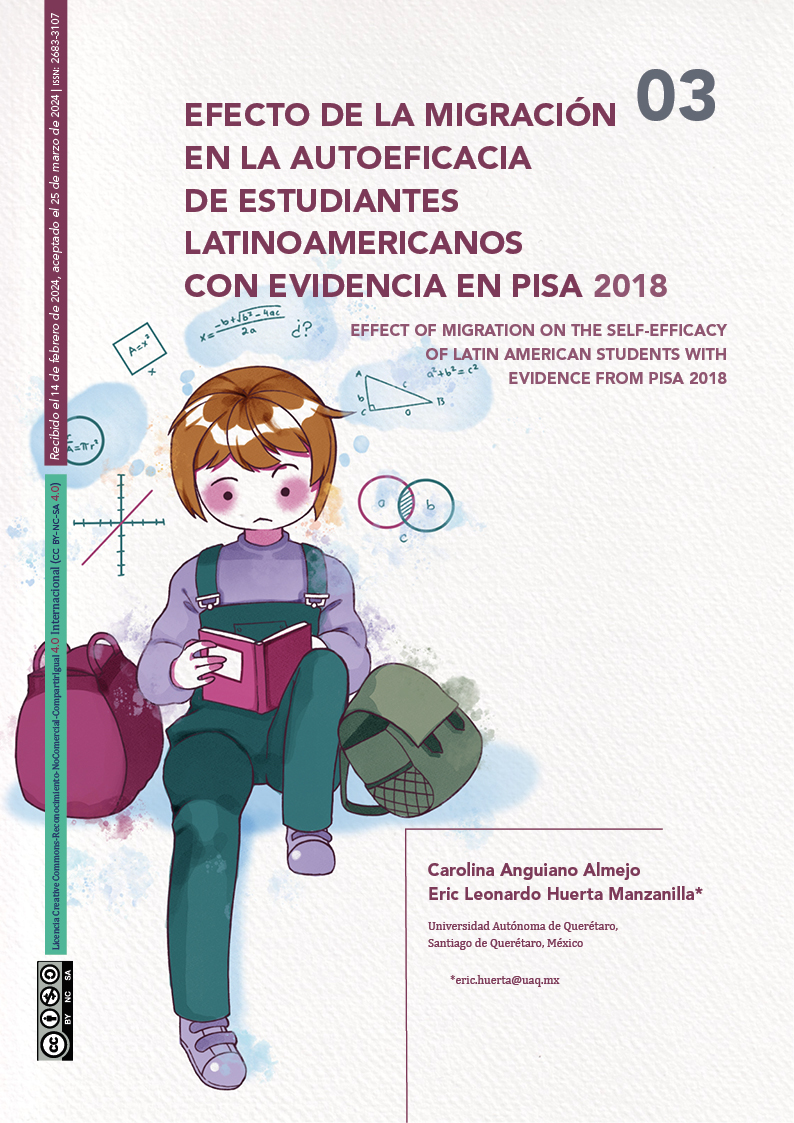Abstract
This work aims to find the relationship between the migrant situation and the self-efficacy of 15-year-old Latin American students who participated in the PISA 2018 test. Self-efficacy is the thought of having the ability to perform an activity. Likewise, self-efficacy is a factor involved in the learning process, reflected in academic achievement and emotional development about oneself. In this work, the PISA 2018 database was used, through statistical analysis to reveal the effect of the migratory situation of Latin American students on their level of self-efficacy.
References
“Niños y jóvenes migrantes”, Portal de Datos sobre Migración, el 6 de mayo de 2021. https://www.migrationdataportal.org/es/themes/ninos-migrantes (consultado el 25 de abril de 2023).
M. Jacobo-Suárez (México), “De regreso a ‘casa’ y sin apostilla: estudiantes mexicoamericanos en México/Back home without apostille: Mexican-American students in Mexico”, Sinéctica, núm. 48, Art. núm. 48, mar. 2017, Consultado: el 2 de mayo de 2023. [En línea]. Disponible en: https://sinectica.iteso.mx/index.php/SINECTICA/article/view/712
V. Zuniga y M. Vivas Romero, "Divided families, fractured schooling, in Mexico: educational consequences of children exposition to international migration”. Centre d’Études Mexicaines et Centraméricaines, Mexico City, Mexico, 2014. Consultado: el 6 de junio de 2023. [En línea]. Disponible en: https://orbi.uliege.be/handle/2268/166110
“Obstáculos de incorporación educativa de migrantes retornados al Estado de México y Nuevo León | Economía Sociedad y Territorio”. https://est.cmq.edu.mx/index.php/est/article/view/1701 (consultado el 2 de mayo de 2023).
S. Rodríguez, A. Valle, L. M. Gironelli, E. Guerrero, B. Regueiro, y I. Estévez, “Performance and well-being of native and immigrant students. Comparative analysis based on PISA 2018”, Journal of Adolescence, vol. 85, pp. 96–105, dic. 2020, doi: 10.1016/j.adolescence.2020.10.001.
A. A. Alegre, “Academic Self-Efficacy, Self-Regulated Learning and Academic Performance in First-Year University Students”, Journal of Educational Psychology - Propositos y Representaciones, vol. 2, núm. 1, pp. 101–120, 2014.
E. M. Azila-Gbettor, C. Mensah, M. K. Abiemo, y M. Bokor, “Predicting student engagement from self-efficacy and autonomous motivation: A cross-sectional study”, Cogent Education, vol. 8, núm. 1, p. 1942638, ene. 2021, doi: 10.1080/2331186X.2021.1942638.
“Self-efficacy in educational settings: Recent research and emerging directions | Emerald Insight”. https://www.emerald.com/insight/content/doi/10.1108/S0749-7423%282010%29000016A004/full/html (consultado el 14 de agosto de 2023).
D. H. Schunk y M. K. DiBenedetto, “Chapter Four - Self-efficacy and human motivation”, en Advances in Motivation Science, A. J. Elliot, Ed., en Advances in Motivation Science, vol. 8. Elsevier, 2021, pp. 153–179. doi: 10.1016/bs.adms.2020.10.001.
J. E. Maddux y M. A. Stanley, “Self-Efficacy Theory in Contemporary Psychology: An Overview”, https://doi.org/10.1521/jscp.1986.4.3.249, el 19 de enero de 2011. https://guilfordjournals.com/doi/10.1521/jscp.1986.4.3.249 (consultado el 14 de agosto de 2023).
R. Cera, M. Mancini, y A. Antonietti, “Relationships between Metacognition, Self-efficacy and Self-regulation in Learning”, Journal of Educational, Cultural and Psychological Studies (ECPS Journal), vol. 4, núm. 7, Art. núm. 7, jul. 2013, doi: 10.7358/ecps-2013-007-cera.
F. Pajares y D. H. Schunk, “Self-beliefs and school success: Self-efficacy, self-concept, and and school achievement”, en Self perception, en International perspectives on individual differences, Vol. 2. Westport, CT, US: Ablex Publishing, 2001, pp. 239–265.
“PISA 2018 Assessment and Analytical Framework | en | OECD”. https://www.oecd.org/education/pisa-2018-assessment-and-analytical-framework-b25efab8-en.htm (consultado el 8 de septiembre de 2022).
M. Karakus, M. Courtney, y H. Aydin, “Understanding the academic achievement of the first- and second-generation immigrant students: a multi-level analysis of PISA 2018 data”, Educ Asse Eval Acc, jun. 2022, doi: 10.1007/s11092-022-09395-x.
J. S. Rizzotto y M. T. A. França, “Indiscipline: The school climate of Brazilian schools and the impact on student performance”, International Journal of Educational Development, vol. 94, p. 102657, oct. 2022, doi: 10.1016/j.ijedudev.2022.102657.
T. Agasisti, F. Avvisati, F. Borgonovi, y S. Longobardi, “Academic resilience: What schools and countries do to help disadvantaged students succeed in PISA”, OECD, Paris, ene. 2018. doi: 10.1787/e22490ac-en.
L. Cerna, O. Brussino, y C. Mezzanotte, “The resilience of students with an immigrant background: An update with PISA 2018”, OECD, Paris, dic. 2021. doi: 10.1787/e119e91a-en.

This work is licensed under a Creative Commons Attribution-NonCommercial-ShareAlike 4.0 International License.
Copyright (c) 2024 Perspectivas de la Ciencia y la Tecnología


